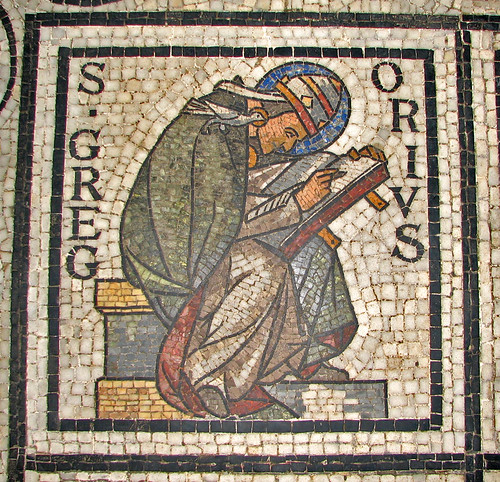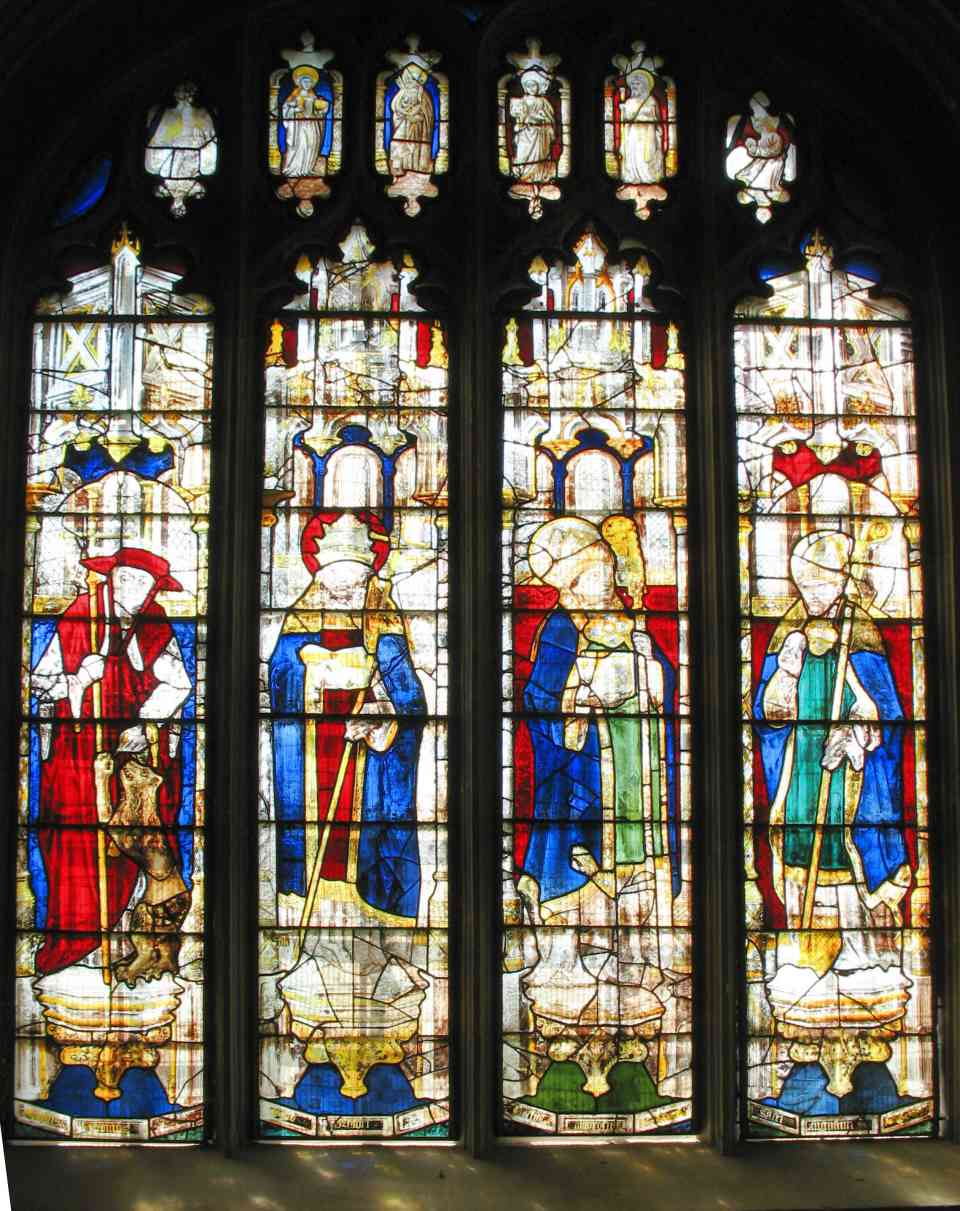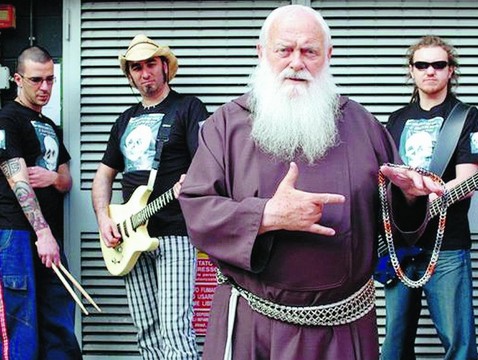Somebody threw up ordination vows in my face. (I took vows as a deacon in the PCUSA, serving for three years before I left for seminary where I continued diaconal ministry...though not service on a board of deacons.)
Apparently, ordination vows are supposed to make us timid in doctrine and all inclusive to error. One of the reasons I had to leave the PCUSA was because the vows I'd taken could no longer be fulfilled when they'd been rendered null by the official endorsement of heresy (not just heterodoxy within the Reformed camp, but outright heresy). Others have experienced the same alienation in other churches. I sought a communion where I could be a true friend in ministry to my brother presbyters, not just an official colleague. That required a binding assent to basic Christian truths that simply does not exist in the PCUSA.
My interlocutor accused me of making up vows. HA! IF anybody made up vows, drawing them out of the zeitgeist rather than the apostolic faith once delivered, it was the UPCUSA in 1967 (and the PCUSA after the 1983 merger). You can see a nice historical source on all the vows here (Presbyterian, as well as Anglican).
Below is the examination that I took, and the vows I made in a public Pontifical celebration of the Holy Eucharist. Below them are the classical Anglican Ordinal formularies as found in the 1662 & 1928 BCP. Mine are slightly different in a few places because - until the orthodox Anglican merger is finished - our patriarchal oversight is currently through a church holding apostolic succession through the Roman Catholic Church. Our BCP rite was emended in a few places to ensure that the Roman See would acknowledge validity of orders (even if they find them illicit). This has been historically important due to our churches having a considerable number of ex-Roman Catholics who were influenced by the charismatic movement of the late 1960s and early 1970s. 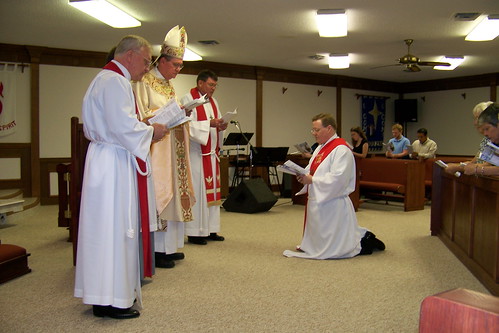 Bishop My brother, the Church is the family of God, the body of Christ, and the temple of the Holy Spirit. All baptized people are called to make Christ known as Savior and Lord, and to share in the renewing of his world. Now you are called to work as a pastor, priest, and teacher, together with your bishop and fellow presbyters, and to take your share in the councils of the Church. As a priest, it will be your task to proclaim by word and Deed the Gospel of Jesus Christ, and to fashion your life in accordance with its precepts. You are to love and serve the people among whom you work, caring alike for young and old, strong and weak, rich and poor. You are to preach, to declare God's forgiveness to penitent sinners, to pronounce God's blessing, to share in the administration of Holy Baptism and in the celebration of the mysteries of Christ's Body and Blood, and to perform the other ministrations entrusted to you. In all that you do, you are to nourish Christ's people from the riches of his grace, and strengthen them to glorify God in this life and in the life to come.
Bishop My brother, the Church is the family of God, the body of Christ, and the temple of the Holy Spirit. All baptized people are called to make Christ known as Savior and Lord, and to share in the renewing of his world. Now you are called to work as a pastor, priest, and teacher, together with your bishop and fellow presbyters, and to take your share in the councils of the Church. As a priest, it will be your task to proclaim by word and Deed the Gospel of Jesus Christ, and to fashion your life in accordance with its precepts. You are to love and serve the people among whom you work, caring alike for young and old, strong and weak, rich and poor. You are to preach, to declare God's forgiveness to penitent sinners, to pronounce God's blessing, to share in the administration of Holy Baptism and in the celebration of the mysteries of Christ's Body and Blood, and to perform the other ministrations entrusted to you. In all that you do, you are to nourish Christ's people from the riches of his grace, and strengthen them to glorify God in this life and in the life to come.
Bishop My brother, do you believe that you are truly called by God and his Church to this priesthood?
Ordinand I believe I am so called.
Bishop Do you now in the presence of the Church commit yourself to this trust and responsibility?
Ordinand I do.
Bishop Will you respect and be guided by the pastoral direction and leadership of your bishop?
Ordinand I will.
Bishop: Will you be diligent in the reading and study of the Holy Scriptures, and in seeking the knowledge of such things as may make you a stronger and more able minister of Christ?
Ordinand I will.
Bishop Will you endeavor so to minister the Word of God and the sacraments of the New Covenant,that the reconciling love of Christ may be known and received?
Ordinand I will.
Bishop Will you undertake to be a faithful pastor to all whom you are called to serve, laboring together with them and with your fellow ministers to build up the family of God?
Ordinand I will.
Bishop Will you do your best to pattern your life and that of your family, or in accordance with the teachings of Christ, so that you may be a wholesome example to your people?
Ordinand I will.
Bishop Will you persevere in prayer, both in public and in private, asking God's grace, both for yourself and for others, offering all your labors to God, through the mediation of Jesus Christ, and in the sanctificationof the Holy Spirit?
Ordinand I will.
Bishop May the Lord who has given you the will to do these things give you the grace and power to perform them.
Ordinand Amen.
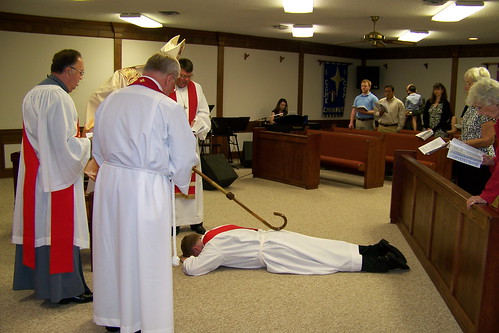
The Consecration of the Priest
All stand except the ordinand, who lies prostrate before the Bishop and the presbyters who stand to the right and left of the Bishop.
The hymn Veni Sancte Spiritus, is sung.
A period of silent prayer follows, the ordinand kneels before the bishop, the people still standing.
Bishop God and Father of all, we praise you for your infinite love in calling us to be a holy people in the kingdom of your Son Jesus our Lord, who is the image of your eternal and invisible glory, the firstborn among many brethren, and the head of the Church. We thank you that by his death he has overcome death, and, having ascended into heaven, has poured his gifts abundantly upon your people, making some apostles, some prophets, some evangelists, some pastors and teachers, to equip the saints for the work of ministry and the building up of his body.
The Bishop lays hands upon the head of the ordinand, the Priests who are present also laying on their hands.
Bishop Therefore, Father, through Jesus Christ your Son, give your Holy Spirit to Christopher; fill him with grace and power, and make him a priest in your Church. May he exalt you, O Lord, in the midst of your people; offer spiritual sacrifices acceptable to you; boldly proclaim the gospel of salvation; and rightly administer the sacraments of the New Covenant. Make him a faithful pastor, a patient teacher, and a wise councilor. Grant that in all things he may serve without reproach, so that your people may be strengthened and your Name glorified in all the world. All this we ask through Jesus Christ our Lord, who with you and the Holy Spirit lives and reigns, one God, for ever and ever.
People AMEN!
The new Priest is now vested according to the order of priests.
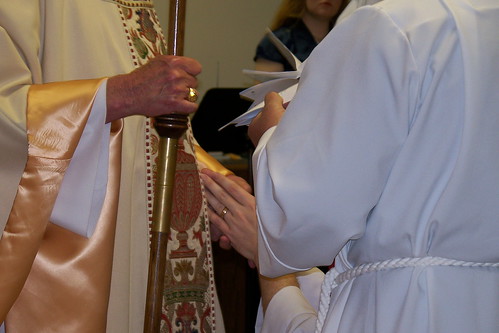 The new priest kneels before the Bishop for the anointing of his hands with Sacred Chrism, with the Bishop saying these words:
The new priest kneels before the Bishop for the anointing of his hands with Sacred Chrism, with the Bishop saying these words:
Bishop The Father anointed our Lord Jesus Christ through the power of the Holy Spirit. May Jesus preserve you to sanctify the Christian people and to offer sacrifice to God.
Priest Amen.
The Bishop anoints the hands of the new priest saying:
Bishop Grant, O Lord, to consecrate and sanctify these hands by this unction and by our blessing; that whatsoever they shall bless may be blessed and whatsoever they shall consecrate may be consecrated and sanctified; in the name of our Lord Jesus Christ. Amen.
Bishop then gives a Bible to the newly ordained, saying
Bishop Receive this Bible as a sign of the authority given you to preach the Word of God and to administer his holy Sacraments. Do not forget the trust committed to you as a priest of the Church of God.
The wife of the new priest is call forward and the bishop prays for the new priest and his wife.
The Bishop greets the newly ordained and his wife.
Vows for Anglican Priesthood
Book of Common Prayer 1662 & 1928
DO you think in your heart, that you are truly called, according to the will of our Lord Jesus Christ, and according to the Canons of this Church, to the Order and Ministry of Priesthood?
Answer. I think it.
ARE you persuaded that the Holy Scriptures contain all Doctrine required as necessary for eternal salvation through faith in Jesus Christ? And are you determined, out of the said Scriptures to instruct the people committed to your charge; and to teach nothing, as necessary to eternal salvation, but that which you shall be persuaded may be concluded and proved by the Scripture?
Answer. I am so persuaded, and have so determined, by God's grace.
WILL you then give your faithful diligence always so to minister the Doctrine and Sacraments, and the Discipline of Christ, as the Lord hath commanded, and as this Church hath received the same, according to the Commandments of God; so that you may teach the people committed to your Cure and Charge with all diligence to keep and observe the same?
Answer. I will so do, by the help of the Lord.
WILL you be ready, with all faithful diligence, to banish and drive away from the Church all erroneous and strange doctrines contrary to God's Word; and to use both public and private monitions and exhortations, as well to the sick as to the whole, within your Cures, as need shall require, and occasion shall be given?
Answer. I will, the Lord being my helper.
WILL you be diligent in Prayers, and in reading the Holy Scriptures, and in such studies as help to the knowledge of the same, laying aside the study of the world and the flesh?
Answer. I will endeavour so to do, the Lord being my helper.
WILL you be diligent to frame and fashion your own selves, and your families, according to the Doctrine of Christ; and to make both yourselves and them, as much as in you lieth, wholesome examples and patterns to the flock of Christ?
Answer. I will apply myself thereto, the Lord being my helper.
WILL you maintain and set forwards, as much as lieth in you, quietness, peace, and love, among all Christian people, and especially among them that are or shall be committed to your charge?
Answer. I will so do, the Lord being my helper.
WILL you reverently obey your Ordinary, and other chief Ministers, unto whom is committed the charge and government over you; following with a glad mind and will their godly admonitions, and submitting yourselves to their godly judgments?
Answer. I will so do, the Lord being my helper.
Then, shall the Bishop, standing up, say,
ALMIGHTY God, who hath given you this will to do all these things; Grant also unto you strength and power to perform the same, that he may accomplish his work which he hath begun in you; through Jesus Christ our Lord. Amen..
Vows for Anglican Bishop
Book of Common Prayer 1662 & 1928
BROTHER, forasmuch as the Holy Scripture and the ancient Canons command, that we should not be hasty in laying on hands, and admitting any person to Government in the Church of Christ, which he hath purchased with no less price than the effusion of his own blood; before we admit you to this Administration, we will examine you in certain Articles, to the end that the Congregation present may have a trial, and bear witness, how you are minded to behave yourself in the Church of God.
ARE you persuaded that you are truly called to this Ministration, according to the will of our Lord Jesus Christ, and the order of this Church?
Answer. I am so persuaded.
ARE you persuaded that the Holy Scriptures contain all Doctrine required as necessary for eternal salvation through faith in Jesus Christ? And are you determined out of the same Holy Scriptures to instruct the people committed to your charge; and to teach or maintain nothing, as necessary to eternal salvation, but that which you shall be persuaded may be concluded and proved by the same?
Answer. I am so persuaded, and determined, by God's grace.
WILL you then faithfully exercise yourself in the Holy Scriptures, and call upon God by prayer for the true understanding of the same; so that you may be able by them to teach and exhort with wholesome Doctrine, and to withstand and convince the gainsayers?
Answer. I will so do, by the help of God.
ARE you ready, with all faithful diligence, to banish and drive away from the Church all erroneous and strange doctrine contrary to God's Word; and both privately and openly to call upon and encourage others to the same?
Answer. I am ready, the Lord being my helper.
WILL you deny all ungodliness and worldly lusts, and live soberly, righteously, and godly in this present world; that you may show yourself in all things an example of good works unto others, that the adversary may be ashamed, having nothing to say against you?
Answer. I will so do, the Lord being my helper.
WILL you maintain and set forward, as much as shall lie in you, quietness, love, and peace among all men; and such as be unquiet, disobedient, and criminous, within your Diocese, correct and punish, according to such authority as you have by God's Word, and as to you shall be committed by the Ordinance of this Realm?
Answer. I will so do, by the help of God.
WILL you be faithful in Ordaining, sending, or laying hands upon others?
Answer. I will so be, by the help of God.
WILL you shew yourself gentle, and be merciful for Christ's sake to poor and needy people, and to all strangers destitute of help?
Answer. I will so shew myself, by God's help.
ALMIGHTY God, our heavenly Father, who hath given you a good will to do all these things; Grant also unto you strength and power to perform the same; that, he accomplishing in you the good work which he hath begun, you may be found perfect and irreprehensible at the latter day; through Jesus Christ our Lord. Amen.
Then shall the Bishop elect put on the rest of the Episcopal habit; and kneeling down, Veni, Creator Spiritus shall be sung or said over him; the Archbishop beginning, and the Bishops, with others that are present, answering by verses, as followeth.
 Lutherans turned their confessionally robust Christ into a zeitgeist infused prophet by virtue of the kenotic theory. Once Christ is no longer Lord, you needn't reverence or obey him...that's "law" and not grace. And so you end up knowing God through a defanged Jesus, and suddenly God is no longer the Most Holy, Undivided, and Consubstantial Trinity, but a being of your own making...maybe even a Goddess! The resultant antinomianism speaks for itself.
Lutherans turned their confessionally robust Christ into a zeitgeist infused prophet by virtue of the kenotic theory. Once Christ is no longer Lord, you needn't reverence or obey him...that's "law" and not grace. And so you end up knowing God through a defanged Jesus, and suddenly God is no longer the Most Holy, Undivided, and Consubstantial Trinity, but a being of your own making...maybe even a Goddess! The resultant antinomianism speaks for itself.













